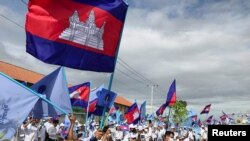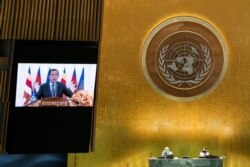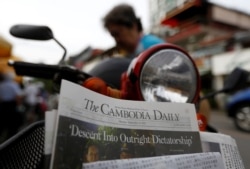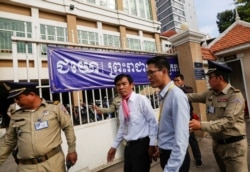On August 3, the United Nations High Commissioner for Human Rights (OHCHR) in Cambodia released a report on the state of press freedom in the Southeast Asian country.
Prime Minister Hun Sen, who has ruled Cambodia since 1985 and turned the country into a de facto one-party state, has undermined press freedom to maintain his grip on power.
With elections less than a year away, Cambodia’s rubber-stamp National Assembly (lower house) on August 7 approved a constitutional amendment that will allow Hun Sen to anoint his son as successor.
The OHCHR report found that as Cambodia prepares for its general election in July 2023, press freedom is in a “perilous state,” with “journalists facing various forms of harassment and pressure, most notably through the criminal justice system, for their work.”
Cambodia’s Permanent Mission to the United Nations responded by calling the report “biased and selective.”
“Cambodia cherishes professional reporters who neither breach the rights of others nor twist the facts,” the mission said.
“Law enforcement on law-breaking journalists and entities cannot be construed as a restriction of the press freedom.”
That is false. Although Cambodia claims to only go after “law-breaking journalists and entities,” journalists are targeted merely for covering issues that affect the powerful.
Article 41 of Cambodia’s Constitution guarantees freedom of expression.
Article 20 of The Law on the Press 1995 (“Press Law”) guarantees that “no person shall be arrested or subjected to criminal charges as a result of the expression of opinions.”
There are limits on press freedom, including a prohibition on the publication of information that “may affect national security and political stability” – terms that are not explicitly defined.
However, the OHCHR report notes that criminal law, and not the Press Law, “is overwhelmingly used to regulate the press and the actions of journalists.”
“For years, the authorities in Cambodia have actively adopted legislation restricting civic space generally and press freedom in particular,” the OHCHR found.
“Laws and other instruments have been adopted, which empower the authorities to censor and place journalists and others under surveillance, and which extend the Government’s ability to target media work and freedom of expression through the courts.”
The OHCHR said that press freedom is “of particular importance in the context of elections,” as a free press allows voters to inform themselves “of the issues at stake” while candidates can convey their message to the electorate.
Not in Hun Sen’s autocratic version of “democracy.”
Hun Sen launched what the Reporters Without Borders (RSF) press advocacy group called “a ruthless war against independent journalism before the 2018 elections,” which coincided with a five-year crackdown on political opponents.
Reporters Without Borders said the journalists have been hit with “absurd, trumped-up charges” intended to “intimidate all of Cambodia’s journalists.”
The U.N. report said that since January 2017, the U.N. Human Rights Office in Cambodia had documented 23 cases of authorities targeting journalists with criminal charges “as a result of their work.”
The OHCHR noted the case of Aun Pheap and Zsombor Peter, two former Cambodia Daily journalists who were charged with “incitement to commit a felony” in August 2017 after covering commune council elections in Pate commune, Ratanakiri province. (Editor’s Note: Zsombor Peter is a regular contributor to VOA coverage.)
Pate was the only commune in Ratanakiri where Hun Sen’s ruling Cambodian People’s Party (CPP) failed to win in the 2012 commune council elections.
Sources told the OHCHR that the journalists disobeyed orders not to interview local residents and were accused of “inciting voters” to support the now-dissolved opposition Cambodia National Rescue Party (CNRP).
Authorities forced The Cambodia Daily to close in September 2017. In May 2017, a rival newspaper, The Phnom Penh Post, was sold to a Malaysian investor with ties to Hun Sen, prompting fears of further censorship.
Cambodian authorities sentenced Australian citizen journalist James Ricketson to six years in prison on espionage charges for filming an opposition rally in June 2017. He was granted a pardon and released in September 2018.
In November 2017, Uon Chhin and Yeang Sothearin, formally journalists for Radio Free Asia (RFA), a Voice of America sister organization, were hit with false charges of “supplying a foreign state with information prejudicial to the national defense of Cambodia.”
The journalists had covered issues sensitive to Cambodian authorities, including human rights violations. Their arrest came two months after Cambodian authorities forced RFA to shut down operations in the country.
Authorities subsequently charged Uon Chhin and Yeang Sothearin with producing pornography. Their case remains in limbo.
In October 2020, Sovann Rithy, who runs the Facebook news outlet FB TV, was given a suspended 18-month sentence for repeating Hun Sen’s own comments. Hun Sen had told motorcycle taxi drivers reeling from the COVID-19 pandemic to sell their vehicles to buy food, as the government could not help them.
In November 2020, Ros Sokhet, who runs the Khmer-language news website Cheat Khmer, was sentenced to 18 months in prison for “incitement to provoke serious chaos in social security.” Ros Sokhet had criticized Hun Sen’s plans to pick his son as successor, and also the government for not helping people saddled with debt thanks to COVID-19.
Shawn Crispin, senior Southeast Asia representative for the Committee to Protect Journalists, called Ros Sokhet’s sentencing “Cambodian Prime Minister Hun Sen’s latest crime against the free press.”
In December 2020, Sok Oudom, who runs the Rithysen FM radio station and news website, was sentenced to 20 months in prison for reporting on a land dispute involving the military.
In July 2021, Cambodia’s Ministry of Information announced it was creating a “Monitoring Committee for Journalism Ethics,” which journalists and rights advocates fear would further hamper press freedom.
Daniel Bastard, who heads Reporters Without Borders’ Asia-Pacific desk, called the committee “a new tool of censorship and intimidation that Prime Minister Hun Sen's government is deploying in order to silence any media outlets that dare to question its policies.”
In March, Cambodia’s Information Ministry stripped three online news outlets of their licenses for allegedly violating journalistic ethics.
“By way of ethical violations, what the three news sites have in common is having recently published investigative stories about the rampant corruption within Cambodia’s political and economic elites,” Reporters Without Borders said.
Cambodia has also mulled setting up its own version of China’s “Great Firewall,” which Human Rights Watch warned “greatly risks restricting the free flow of information between Cambodia and the rest of the world.”
Cambodia is ranked 142nd out of 180 countries in RSF's 2022 World Press Freedom Index.








